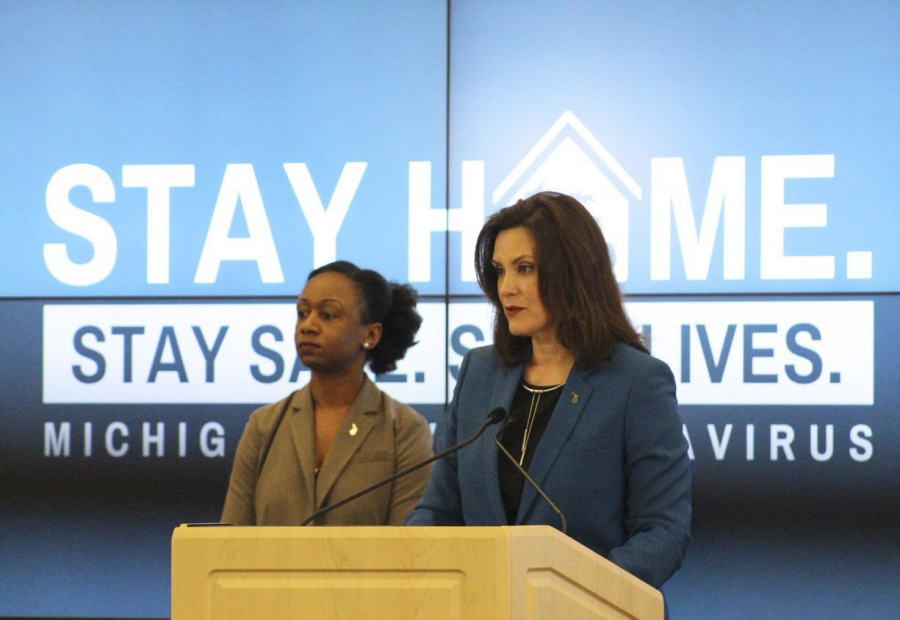Whitmer’s extended lockdown pushes Michigan toward recovery
(Photo courtesy of Lansing City Pulse)
Michigan Governor Gretchen Whitmer, right, along with Michigan Health and Human Services Chief Medical Executive Dr. Joneigh Khaldun, left, have advocated for a slow reopening of the Michigan economy to avoid another COVID-19 wave. More than 4,700 Michigan deaths have been attributed to the virus as of May 13.
May 13, 2020
As the lockdown order continues and the days in quarantine start to blend together, it’s easy to get irritated and crave a life without social distancing. With every extension of the stay-at-home order comes a wave of desperation as Michigan residents long for life to go back to the way it was. However, with Michigan being one of the most infected states in the country with over 48,000 confirmed cases of coronavirus as of May 13th, lockdown is an important and necessary step in the long road to the return to normalcy.
Overwhelmed with the amount of sick individuals, hospitals are still battling to help everyone who is in need. At one point, it was feared that there would not be enough life-saving equipment, such as ventilators, to save as many people as possible; when lockdown orders were instituted on March 23rd, they likely saved some Michigan hospitals from being forced to ration care.
Today, most hospitals are no longer lacking in supplies. Doctors, nurses, and other medical technicians are working in order to keep the population safe, but the more people continue to gather, the longer it will take for the virus to run its course and for hospitals to return to their normal procedures.
Though Michigan’s health facilities still have many COVID-19 patients, conditions have begun to improve as the state moves into Phase 3 of Governor Gretchen Whitmer’s MI Safe Start Plan. Whitmer’s six-step plan has been described as “critical” in the battle to avoid a second wave of infection. Phase 3, known as “Flattening,” states that the epidemic is no longer increasing and that the health system’s capacity is becoming sufficient. Since Michiganders are some of the most loyal citizens in terms of remaining in lockdown, earning an “A” ranking and reducing over 70% of travel, it is evident that staying home is preventing the virus from spreading to catastrophic levels.
Despite this, multiple protests have taken place at the Capitol building in Lansing, as citizens become infuriated with Whitmer’s lengthened stay-at-home orders and her refusal to let non-essential workers return to their jobs.

Several protests have been organized over Whitmer’s Stay-at-Home order, which forbids many businesses from opening through May 28th.
Though many have argued in favor of a compromise, Whitmer has refused to budge. “We are not in a political crisis where we can negotiate and find common ground,” Whitmer explained. “We are in a public health crisis.”
Whitmer has acknowledged that she understands and respects the anger and restlessness that many are feeling during lockdown, but that Michiganders who can need to do their part by staying safe and remaining in quarantine until conditions improve with time. Whitmer and her government have been working with businesses in order to reopen as many places as possible, including manufacturing and construction, while still being extremely cautious. Though Whitmer is doing her best to compromise, she is not willing to sacrifice lives for economic gain.
According to the World Economic Forum, if there were no lockdown or social distancing measures in place, 81% of the U.S. would become infected, ultimately killing about 2.2 million people. Even if someone appears completely healthy, COVID-19 can spread unknowingly without symptoms; every time people gather in public, there is a chance that the virus could infect countless more individuals.
Although lockdown is anything but easy, it is necessary in order to prevent the deaths of innocent citizens. In order to prevent further catastrophe, help medical professionals, and return to normal as quickly and safely as possible, the best thing that most Michiganders can do is to sit back, be patient, and stay home.
